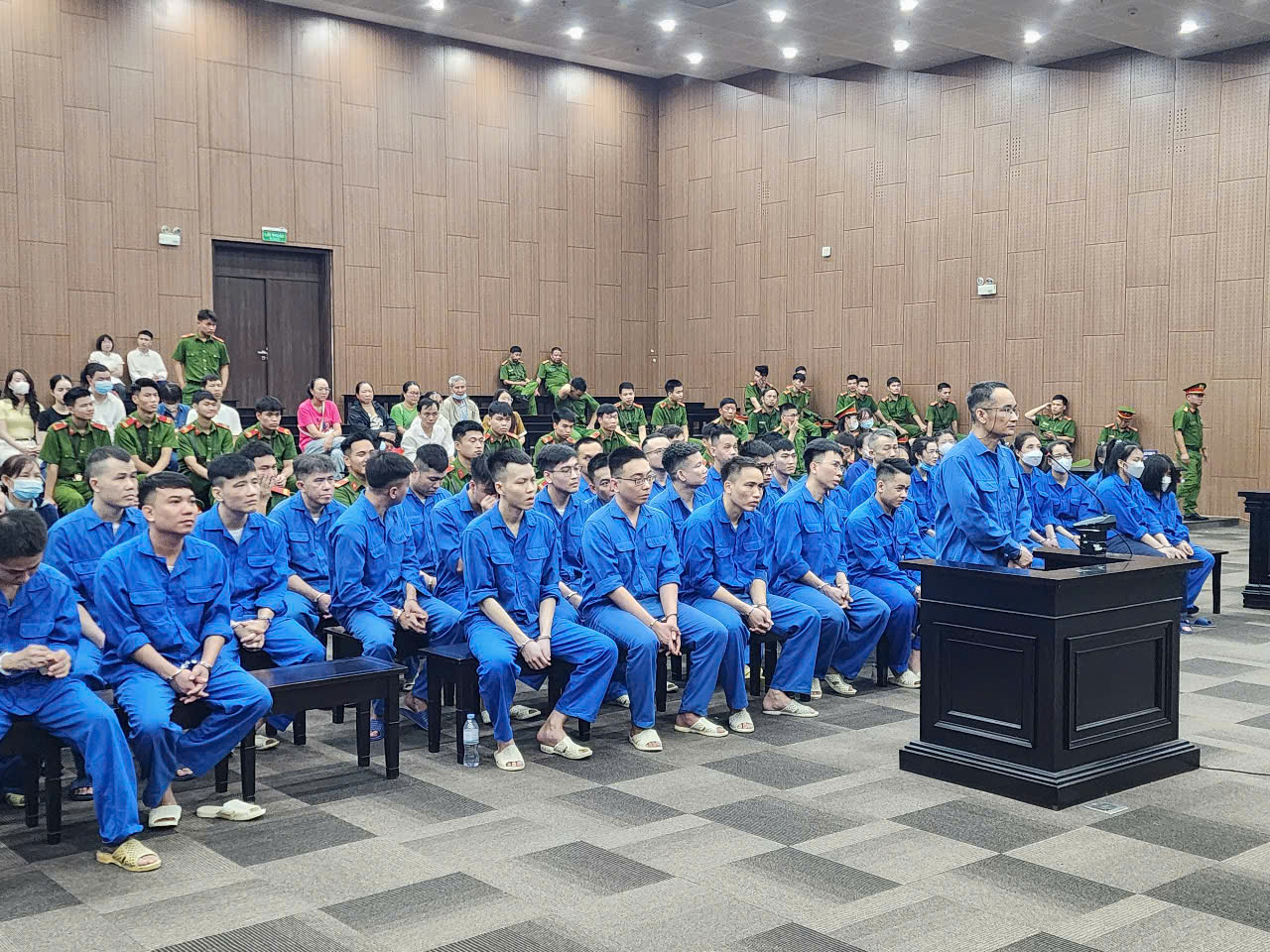On 22/7, the Hanoi People's Court continued the second day of the trial of 45 defendants in a case of property extortion involving a network of seven debt collection companies established and directed by 47-year-old Le Quoc Thong (currently a fugitive).
The prosecution alleges that in 2018, Thong purchased 238,160 unsecured personal loan debts from a business for 12-15% of their face value (totaling 3,500 billion VND) and was provided with the borrowers' personal information. Thong then established seven companies and recruited staff to begin collecting the debts.
Each employee was given a target of contacting 400-500 debtors per month. These 103 employees, mostly in their 20s and 30s, were divided into 11 teams, each with a monthly monetary KPI. Employees who failed to meet their quota for two consecutive months were fired.
 |
The defendants in court. Photo: Danh Lam |
The defendants in court. Photo: Danh Lam
Team leaders, the defendants in this case, pushed their staff to aggressively pursue collections to achieve sales targets and earn commission percentages. The companies were equipped with an automated switchboard to call clients and voice-changing software (allowing men to sound like women and vice versa).
The prosecution alleges that the debt collection tactics included: using multiple burner phone numbers, making incessant calls and sending abusive text messages, and threatening to harm the debtors' children, relatives, and colleagues to exert pressure.
More aggressive tactics involved photoshopping images of debtors or their relatives into obscene pictures, creating false information (unwed pregnancy, prostitution, incest, drug addiction, infidelity), and posting these on social media to defame them.
The prosecution determined that Thong's network collected 571 billion VND through these methods. However, only 26 victims have been identified so far, with extortion totaling 904 million VND.
Firing for failing to meet KPIs for two months
Besides the fugitive Thong, the network's leadership and team leaders are on trial. Thong's right-hand man, 51-year-old Tran Hong Tien, the executive director of the entire system, was a business associate of Thong's from the early days of their debt collection activities.
The prosecution alleges that as early as 2017, Tien and Thong established companies to purchase bad debts and organize collection efforts. They frequently created new companies with identical operations. According to the prosecution, this was to "conceal and evade detection by the police of their illegal debt collection activities."
In court, Tien explained that the reason for establishing multiple companies with the same debt collection operations was due to the increasing capital requirements of the "profession." Despite registering multiple addresses under different directors, the employees of all companies worked in the same location, operated under Thong and Tien's management and personnel organization, and engaged in the same activities.
 |
Tran Hong Tien, executive director of the seven debt collection companies, claimed ignorance of his employees' 'gangster' tactics. Photo: Danh Lam |
Tran Hong Tien, executive director of the seven debt collection companies, claimed ignorance of his employees' 'gangster' tactics. Photo: Danh Lam
Thong held monthly meetings with the leaders and team leaders to review operations. After Thong left the country, he continued to hold weekly Tuesday meetings with Tien to receive reports and issue instructions. Tien testified that Thong also sent direct instructions via email, just as he did when he was in Vietnam.
The network's sole source of income was the money collected from debtors. This money was used to pay employee salaries and the companies that sold the debts. Thong entrusted Tien with financial management but maintained direct oversight and control.
The prosecution alleges Tien was fully aware that the debt collection staff were making abusive phone calls, threats, and creating and posting fabricated information with photoshopped images of debtors and their relatives on social media to pressure clients into paying. Despite this knowledge, Tien continued to encourage these practices. Tien received a monthly salary of 40 million VND.
When the prosecutor questioned him about why he didn't intervene in the employees' "gangster" tactics, Tien replied that it wasn't his area of responsibility. He claimed to be "unaware" and to have "never witnessed" his subordinates' actions of creating obscene images or threatening and harassing debtors on Facebook.
Tien stated that he only occasionally overheard "loud and boisterous" conversations, prompting him to ask Thong, "Why is that happening?"
According to Tien, Thong dismissed it, saying the employees were just "having a little chat. Debt collection requires being loud and boisterous; there's no problem."
 |
The debt collectors at the time of their arrest, early 2023, were all in their 20s and 30s. Photo: Investigating Authority |
The debt collectors at the time of their arrest, early 2023, were all in their 20s and 30s. Photo: Investigating Authority
Similarly claiming ignorance, Nguyen Duc Khoa, 34, Thong's deputy and general director of three companies within the debt collection network, said he only learned of the "gangster" tactics described in the indictment upon his arrest.
Khoa stated that his meetings with team leaders focused solely on KPIs, collected debts, and recruitment to meet the targets set by the company's leadership, specifically Thong.
Khoa received a monthly budget of 50-60 million VND from the company to purchase additional personal information about debtors, beyond what was provided by the companies selling the debts. This included Facebook and Zalo accounts, secondary phone numbers, workplaces, and information about relatives.
Regarding the methods used to pressure employees to collect debts, team leaders stated that they "learned from each other, so there was no need for training." Team leaders simply provided reminders and tracked the amount of debt each employee had collected.
While some team leaders admitted to knowing about their employees' behavior but claimed they neither intervened nor encouraged or pressured them to continue.
The debt collectors testified that they either knew each other and recruited one another, or were directly contacted by the human resources department with job offers. The typical starting salary was 5 million VND per month. Some stated they received a 5 million VND bonus for collecting 100 million VND in debt. The company's general policy was "two months without meeting KPIs, and you're fired."
The 26 victims in the case were not present in court but expressed a common desire for strict punishment and did not seek compensation.
In the remaining cases, authorities have delegated the task of gathering information to the police in various provinces and cities to separate the files for processing.
The trial is expected to last seven days.
Hai Thu












